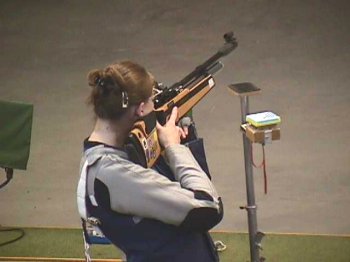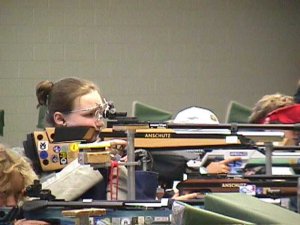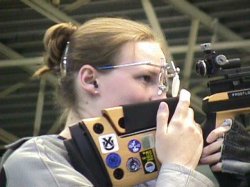INTERVIEW WITH THRINE KANE
Thrine Kane was the winner of the Junior Olympic Air Rifle in Colorado Springs in 1999. She was possibly the biggest surprise of the 2000 US Team Olympic Trials, finishing in second place outright in the National Championship in Women’s 3×20 3 Position. Her consistent match scores in Fort Benning and Wolf Creek earned her a spot on the Olympic team bound for Sydney. We talked in Atlanta shortly after her selection.
When did you start shooting?
I started shooting BB rifles when I was seven at the Freeport Rifle and Revolver Club, which is a pistol club on Long Island in New York. I didn’t start shooting 22 competitively until I was twelve years old. And I’ve been shooting it ever since. I shot my first Junior Olympics when I was thirteen. That was back around 1995. I’m nineteen now.
Who was your greatest shooting influence?
My parents have always been there for me, so they’ve been very supportive and have got me back and forth to shoots. But I did have a friend, whose name was Barbara Scotto, she was a pistol shooter who shot for Freeport. She had basically gone from a nobody to a somebody in a very rapid period of time, just through dedication, shooting her way to championships and medals. I was always impressed by her and I always wanted to be like her. Sadly she had a heart attack and she died in 1998. But she’s always in the back of my mind, she was someone who I’ve always looked up to. She always beat the guys and she always won her medals, and she was always happy about it. She always did everything with a smile. So she was a real inspiration for me.
What brand of rifles do you shoot?
I currently shoot a 1907 Anschutz in 22 and a 2002 compressed air rifle.
What are your preferences for ammunition?
I’ve been working with R10 pellets, and I’ve been working at least in my big competitions with Lapua ammunition. It runs very smoothly through my 22. That’s Lapua Midas.
Do you batch test your ammo through a rest?
The best testing I can do right now is prone (shooting). I don’t really have a rest. I do it in a rest once in a while if it’s very important, but my dad and I just work with what we have. We have limited resources.
How often do you shoot?
I shoot for Xavier University in Cincinnati. I have a range open to me twenty-four hours, seven days a week when I’m in school. And the range I have at home I can use twenty-four hours a day. It’s a fifty yard range, we don’t have fifty meter ranges in New York sadly, but I can go down to my local gun club just seven minutes from my house, shoot whenever it’s light outside and the range is open. It’s nice to have that opportunity, if I wake up in the morning and I feel like going down and shooting. The only thing it’s dependent on is whether the pistol shooters have taken over the range.
What do you think is your most valuable training drill?
To be honest I’m not sure if I have training drills. I haven’t really had any coaching. I mean I’ve never had a coach in my life. I’ve gone to different camps so I’ve possibly had one coach a week in a year who is an expert in shooting who will help me get into positions. I think probably my most valuable asset is my patience. After a bad shot I have the ability to get over it because I’ll laugh the shot off. You’ll see me, for example, sticking my tongue out at the electronic screens here and I’ll physically laugh out loud. That’s one of my valuable assets. I can accept a bad shot and I can move on to the next one and shoot a ten very quickly.
 When you say you laugh it off and move on, do you take time out or can you get back quickly?
When you say you laugh it off and move on, do you take time out or can you get back quickly?
I have to take time to laugh it off. Because if I don’t it will probably still be in the back of my mind. One of the things that I might do, I haven’t done it recently, but back a while when I’d shot a bad shot I would blame it on my friend shooting next to me. “Why did you crossfire? You shouldn’t be doing that!” That was just my way of chuckling and saying, “I couldn’t have done that, I’m better than that”, and moving on to shoot a ten.
How do you handle the mental game in a big match like this?
I’ll be one of the shooters who you see smiling all the time. I’m a very peppy person. I like being involved, I like to chat to people. So a lot of times during the match if I’m having a bad day you’ll see me looking at some blank area and smile to myself. I believe that if you tell yourself that you’re happy and you’re having fun, you will. If I’m not having fun I won’t be shooting well. So that’s my main goal. Even if I shoot poorly and I have fun, I’ve done my job.
That’s a really positive attitude, we don’t often see that in shooters.
I try not to get down on myself too often. I mean you only feel bad later on and you regret it. Because you think, If I’d handled that in a different manner the rest of the match would have been different.
So you’ve made the Olympic Team. Congratulations.
Finally!
Finally?
Well I’ve been shooting for seven years, and I’ve always felt like I’ve been the little girl from New York. No one has ever heard of me, no one knows who I am. Most people think I live in the city, no one knows anything about me, so I think it’s nice to come out here for once and prove to myself that I can do it, and also to prove to everyone else. Even if I don’t have the training that they have, or if I don’t have the international match experience or the coaching that they have, I can do it on my own.
How are the junior shooting programs in New York?
We’ve lost a lot of high school programs, due to all the different gun problems we have, the Columbine shooting and things like that. A lot of the attitudes people have about guns are turning much more negative, which is a real shame because our program in New York used to be wonderful. We had many many high schools shooting and we had state championships. Next year I don’t even know if we’ll have enough teams to hold a county championship, let alone a state championship for high schools. Things are getting out of hand, which is very upsetting for me because my shooting career really started when I got into junior high school. They let me shoot on the high school team because the junior high school didn’t have one. That’s when my shooting career really picked up, when I finally had a bunch of guys I could be with and I had team mates for once, which I’d never had before. I think a lot of people would benefit if they had that team cohesion.
It is a great help to have somebody to shoot and train with.
I’m very fortunate because I chose a good university. I’ve never seen a team as close as we are. We know everything about each other. We probably know more about each other than our parents do. I think that’s what’s really helped me this year. Whenever I’ve needed help there’s always someone to go to for help or there’s always a shoulder to cry on, or you can always go to Al and Al’s always good for advice (he’s the coach).
What’s your funniest shooting experience?
I don’t know if I have a funniest shooting experience. I’ve been laughed at a lot because when I was younger I used to have very bright colorful shooting clothing. My jacket pants used to be green, blue, red and black. And then I’d wear bright yellow spandex and a big blue floppy hat. I was a sight to see. I figured if I couldn’t beat anyone at least I could make them laugh and smile. I could at least make friends and have a good time. That was my way of having a good time. Even if I wasn’t personality bold I could be colorful. I don’t know if that’s really funny or not, but it’s something to look back on and laugh at.
But it led to a place on an Olympic Team.
I shot an entire match with a bee sitting on my shoulder. I did that in prone the other day.
He must have liked the color.
He must have. I was in blue. I’ve totally toned down now, I’ve gone back to blue and gray. My entire wardrobe is blue and gray.
What are your goals now?
Good question. To be honest I haven’t thought about it. I’ve been trying to concentrate on my air rifle match. I have been mentally preparing for that. It’s as if knowing that I’m on the Olympic Team hasn’t really set in yet. It was just another match and I did very well but I had to move on. So right now I’m just focused on my air rifle match. When I’m practicing during the summer I’ll set my next goals.
How are you training over the summer with college out?
I’ll be shooting the Atlanta World Cup it sounds like, but that will be July. I’ve been informed by the national coach that all of us who made the Olympic Team will be going up to Minnesota to train together for a little while and practice our finals competitions. I have a couple of matches at home that I’m still hoping to go to. Even though the World Cup is a big fixture I hope it doesn’t interfere with my home town shooting. So right now I’m just going on a whim, and I’ll take whatever opportunity I can. I’ve never really had an opportunity to train on any great range or with any top notch shooters. I think now doors will be opened up and I’ll have that chance that I need.
What advice would you give to juniors just starting out?
Always believe, no matter what anyone else says, that you can do it, and you can accomplish. Because if you let one person get you down you’ll eventually let yourself down in the long run. Never let the negativity get to you. Always keep a smile on your face because it can only get better. Listen to your mom and dad. They know what’s going on, they probably know what’s good for you too.
Even though it may not seem that way?
Yes. I’ve learned that a lot. The hard way.
